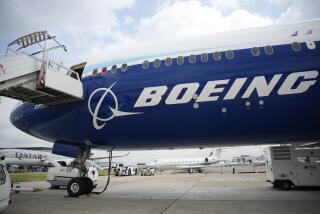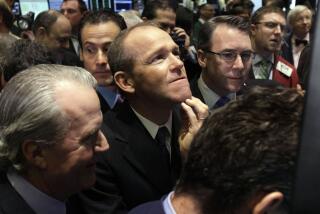Taiwan Aerospace Chairman Abruptly Resigns : Controversy: It’s the latest evidence of turmoil in a proposed deal for part of McDonnell Douglas. A spokesman denies any link to U.S. protests.
The chairman of Taiwan Aerospace Corp., which is negotiating to buy a stake in McDonnell Douglas Corp., has resigned for personal reasons, a company spokesman said.
The abrupt departure of David Huang is just the latest evidence of turmoil in the proposed deal, in which Taiwan Aerospace is seeking to buy up to 40% of McDonnell’s commercial aircraft business for $2 billion.
Taiwan Aerospace spokesman George Liu said Huang had long wanted to leave the company for personal reasons, including concerns about his wife’s health.
Huang could not be reached for comment. But in interviews over the last five months, the 72-year-old engineer has never mentioned a desire to leave his post, which he assumed only last October.
Contacted late Wednesday at the couple’s home in Calabasas, Huang’s wife declined to comment on the statement about her health.
Huang formally offered his resignation Tuesday. McDonnell officials declined to comment on whether his departure would affect the prospective deal. Asked how Huang’s resignation would affect the McDonnell deal, a senior official at Taiwan’s industrial development bureau said: “Maybe better. Maybe worse.”
Denying Taiwanese media reports, Liu said Huang was not forced to resign because of a blunder that triggered protests from U.S. lawmakers and rival plane maker Boeing Co.
Opposition members of Taiwan’s legislature have played tapes of Huang telling an American audience that Taiwan would subsidize the joint venture with McDonnell until it became profitable.
Huang’s assertion stirred political protests in Taiwan by opponents who demanded to know who authorized Huang to commit the Taiwan government to the joint venture. The revelation also put Taiwan Aerospace in hot water, as Washington questioned whether U.S. technology should be sent abroad and Boeing insisted that the deal should not involve Taiwan government money.
McDonnell sorely needs the injection of cash from Taiwan Aerospace, saying that without the support of a major partner, it can’t afford to develop its next-generation aircraft, the MD-12. The deal would enable the second-biggest U.S. plane maker to pay off debt.
Taiwan’s government owns 29% of Taiwan Aerospace, set up in October, 1991, with a capitalization of $200 million. The remaining 71% is held by private investors, including Formosa Plastic group.
Taiwan plans to invest about $4 billion in aerospace manufacturing facilities in the first half of this decade, officials said.
Huang spent his career as an American aerospace engineer and executive at Rockwell International in Southern California. He became an American citizen in 1955 and returned to Taiwan in 1981.
“He chose to quit at this juncture because the initial evaluation for the joint venture with McDonnell has been completed,” Liu said. The board will meet today to choose a new chairman.
China Steel, one of the major partners in the proposed deal with McDonnell, conducted the evaluation. Taiwan news reports said the evaluation is favorable to the venture. Liu said the results will be released by next week.
More to Read
Sign up for Essential California
The most important California stories and recommendations in your inbox every morning.
You may occasionally receive promotional content from the Los Angeles Times.










